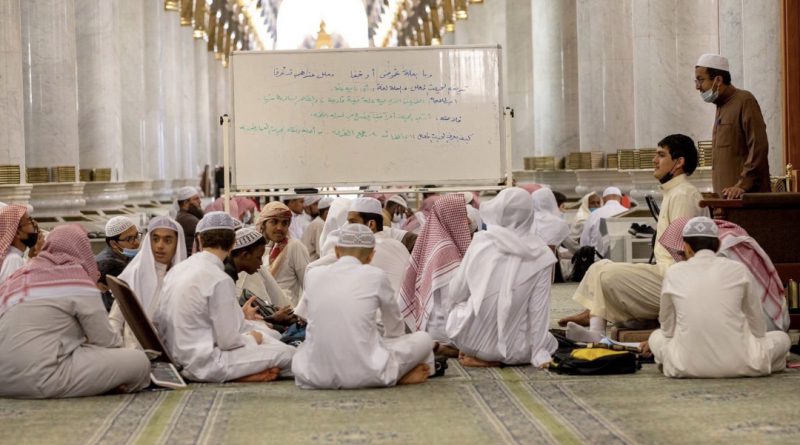Madkhali Salafism: A Quietist Variant Embracing National Loyalty and Challenging Extremism
Madkhalists argue that it is better to work within the existing system and use peaceful means to influence change, rather than resorting to violence.
Madkhali Salafism, a quietist form of Salafi thought, has gained attention for its unique emphasis on loyalty to nations and secular authoritarian governments within the Arab world. This variant, influenced by the teachings of Sheikh Rabee al-Madkhali, distinguishes itself from other Salafi branches and has drawn praise from certain US policy-makers and analysts for its potential in countering violent jihadism.
Loyalty to Nations and Secular Authoritarian Governments
Madkhali Salafism indeed promotes a monarchist approach and advocates unwavering loyalty to secular authoritarian governments in the Arab world. Sheikh Rabee al-Madkhali, a prominent Salafi scholar, has played a significant role in shaping this variant of Salafism, which is known for its quietist stance.
Madkhali Salafists emphasize the importance of avoiding armed rebellion and instead encourage their followers to prioritize patience and endurance when facing political challenges. They believe in the preservation of social order and stability, even if it means supporting authoritarian regimes. This approach contrasts with other Salafi branches that may endorse more active and confrontational forms of resistance.
By advocating loyalty to existing political authorities, Madkhali Salafists aim to maintain social cohesion and avoid the chaos often associated with armed uprisings. Madkhalists argue that it is better to work within the existing system and use peaceful means to influence change, rather than resorting to violence.
Recognition by US Policy-Makers and Analysts
The recognition of Madkhali Salafism by US policy-makers and senior advisors to the U.S. State Department underscores the perceived value of this approach in countering violent jihadism. Figures like Will McCants and Jarret Brachman have advised the US government to engage with the Madkhali group, recognizing its potential as an ally in addressing radical ideologies.
This recognition is significant as it indicates a departure from the traditional approach of viewing Salafism solely through a confrontational lens.
By engaging with the Madkhali group, these policy-makers and advisors believe that it is possible to tap into the potential of this variant of Salafism to counter radical ideologies more effectively. This approach suggests a willingness to explore pragmatic alliances and work with religious groups that promote a non-confrontational approach to governance and social stability.
Presence in Europe
Madkhali movement has gained significant influence within European Muslim communities in recent years. While its influence in the Arab world remains present, it has become more prominent in Europe. Analysts estimate that Madkhalists and their allies make up just over half of the Salafist movement in the Netherlands, highlighting their presence and influence in Europe.
The reasons behind the growth of Madkhali Salafism in Europe are multifaceted. Factors such as migration, the establishment of religious institutions, and the search for a distinct religious identity have contributed to the spread of this variant of Salafism among European Muslims. Additionally, the quietist nature of Madkhali Salafism may resonate with individuals seeking a more conservative and non-confrontational approach to their faith and engagement with society.
The presence of Madkhalists in European Muslim communities has implications for religious dynamics, social integration, and counter-terrorism efforts. European governments and policymakers have been increasingly focused on understanding and monitoring the various Salafi strands, including Madkhali Salafism, to navigate the complexities of religious pluralism, prevent radicalization, and promote social cohesion.
Divergence from Mainstream Salafism
Madkhali Salafists indeed diverged from mainstream Salafism during the Arab Spring, particularly in their response to the Libyan Civil War and the Syrian Civil War. While many Salafists initially opposed these conflicts, the majority eventually supported the opposition due to the perceived extreme violence and oppression of the Gaddafi and Assad regimes.
In contrast, Madkhali Salafists took a different approach. They criticized the mainstream Salafists for their support of the opposition.
This divergence from the mainstream Salafist position during the Arab Spring further highlighted the distinct characteristics of Madkhali Salafism. It showcased their emphasis on non-confrontation and their belief in the preservation of social stability, even in the face of oppressive regimes.
It is important to note that the Madkhali Salafist stance does not imply support for the actions or policies of the Gaddafi or Assad regimes.
Orthodox Lifestyle and Minority Rights
Madkhali Salafists generally prioritize the promotion of a more orthodox Islamic lifestyle among Muslims rather than seeking to convert Western societies to Islam. They tend to focus on religious education, personal piety, and adherence to traditional Islamic practices within their own community.
Madkhali Salafists often accept and defend their rights as a minority community within Western contexts. They recognize the legal frameworks and democratic principles of Western societies and do not typically advocate for reshaping those societies according to their religious beliefs.
By prioritizing the internal religious affairs of their community, Madkhali Salafists aim to strengthen the faith and commitment of their followers, rather than engaging in broader societal transformation.
Critics and Labels
Critics, including Islamists and radical Jihadists, have used the term “Murjiyah” as a derogatory label against Madkhalists. The term “Murjiyah” historically refers to a theological sect within Islam, but in this context, it is used as a pejorative term to criticize Madkhalists for what their critics perceive as “blind obedience” to governments and national laws, rather than actively participating in armed rebellions or seeking to challenge oppressive regimes.
These critics argue that Madkhali Salafists prioritize stability and social order over actively opposing perceived injustices or oppressive regimes. Islamists accuse Madkhalists of being passive, submissive, or even collaborating with authoritarian governments.
Recognition from Policy Makers
Madkhali Salafism continues to evolve and attract attention due to its distinct characteristics. By promoting loyalty to nations and advocating patience over armed rebellion, Madkhalists have carved out a unique position within the broader Salafi spectrum.
Their emphasis on pragmatism and support for secular authoritarian governments sets them apart from other Salafi branches, garnering recognition from policy-makers and analysts. It is important to understand the nuances and influence of Madkhali Salafism within the broader context of Salafi thought and its potential implications for political and social dynamics in the Arab world.



